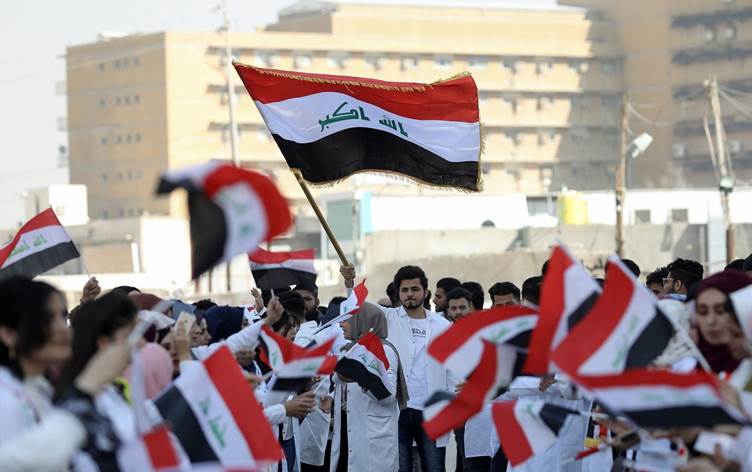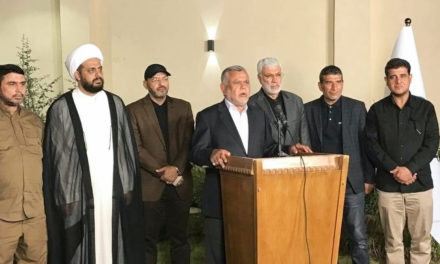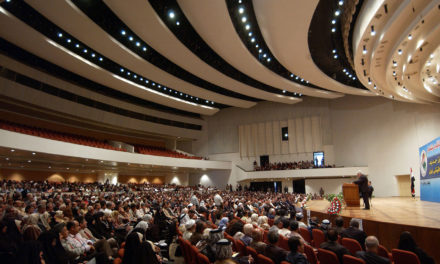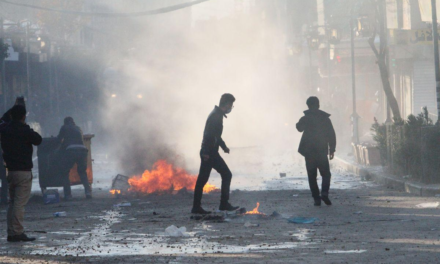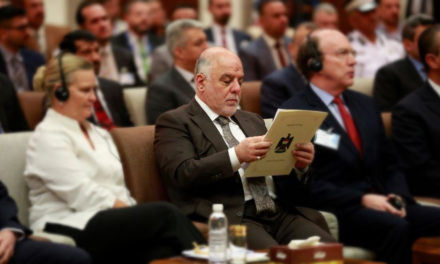(Photo: Hussein Faleh/AFP)
The highest cause of death not from disease in Iraq is by road accidents. Iraq is also the 5th most susceptible country to climate change. And, psychiatry is the only support for mental health, as psychotherapies are not recognised. Twenty years after the U.S. led invasion and five years since the last war, there are needs and opportunities to explore ways of improving quality of life for a population predicted to reach 100 million by 2085. Research with 50 Iraqi academics reveals a compelling if not generalisable case to ‘‘re-activate the role of the Social Sciences” to help with the challenges facing Iraq.
From a western perspective, today’s macro challenges – sociocultural, political economy, security, environment, are the domain of the Social Sciences. What constitutes Iraqi Social Sciences? Responses concur, “all sciences which study human and social life” but many seek clearer delineation for funding, visibility, research and international collaborations.
Politics, sociology, geography, law and economics are often categorised with Humanities in Iraq. This is a continuation from secondary school when children progressing to the final stage are separated onto one of two routes: scientific or literary. University admissions are dependent on each student’s final grade and some subjects such as medicine or engineering need higher scores than others. Science students can choose options for their degree but those in the Literary route are confined to Humanities subjects only.
I encountered anger and frustration from Iraqi scholars about this. Many feel the polarisation between ‘science and stupid’ is unfair and restrictive, as the study limitation does not encourage motivation or happiness. Participants explain how society perceives the difference and underestimates Social Sciences: “If you are in the Literary section you are considered ‘stupid’. Science is valued, it brings prestige. ‘He is rich. He is clever’.”
Philosophically, pure science cannot answer everything, nor are we all natural scientists. The Islamic ‘golden age’ and Bayt al-Hikmah (House of Wisdom) in Baghdad saw innovations in physics, astronomy and engineering. More recently, during the 1960-70s Iraqi higher education was vaunted as the best in west Asia, producing reverence for expert technicians, affording value to the intellectual capital of scientism. However, repression under Saddam’s brutal dictatorship stifled freedoms and universities suffered as the country slid into war with Iran, with four decades of existential strife since then.
An immediate challenge a revived Social Sciences could face is the energy-food-water nexus. Solving Iraq’s energy issues or navigating the ‘next war’ – geopolitics of water scarcity are not solely the domain of technology or engineering. After the electricity network was destroyed in the 1991 Gulf war, Harvard scholars observed that only two of 20 power plants were functional, ‘producing less than 4 percent of the prewar output… [bringing] Iraq’s water purification, distribution and sewage-treatment to a standstill.’ UNSCR sanctions in the 1990s followed by the chaos of disaster capitalism after 2003 means that Iraqis still live with unreliable services. One person laments how “the electricity gets worse… we joke it’s connected to the traffic lights. Government supply lasts 8-10 hours a day, private supply is expensive. Generators are noisy, smoky, with thousands of cables. It’s a huge mess.” If provision were a purely technical matter to resolve, infrastructure would be rebuilt by now. The web of socio-political issues indicates interdisciplinary knowledge and inclusive dialogue are required to find ways forward. With recognition and funding, Social Sciences can progress this.
Technology is another area of urgency. Investment to modernise agriculture is forthcoming but debates about land, planning, ownership, are geographies. Research participants point out how Social Sciences should be “Keeping pace with the progress in societies… which imposed new problems related to the internet, media and the world of technology” and investigating “the influence of social media on norms”. Artificial Intelligence is here. Where else could youth have opportunities for the ethical forays necessary to determine its use, if not in higher education?
The climate crisis and sustainability dominate news and research agendas; Iraq needs to be able to engage with parity also. Desertification contributes to a cataclysmic increase in dust storms affecting people’s ability to venture out, to breathe. Iraqi Social Scientists can co-mitigate worsening conditions, informing directions of travel in policy and practice. English as lingua franca presents an issue but foci should be on generating actors to make meaningful translation available; if the problems are global and intersect, make the literature accessible.
Enhancing Iraqi scholarship could pivot debate arguably ‘colonial in nature’ such as ‘Green Growth’ scenarios, for fairer futures. It could also challenge modes of critical thinking and teaching presented as innovative for Iraqi educators. Sometimes this represents conditioning through years of imperialism and colonising ideologies; these pedagogies are often derived from the west and arguably, even weaponised. Who ‘owns’ concepts of critical thinking? Who arbiters what it isn’t, with all its flaws and inconsistencies? Moreover, problematic concepts of freedom of speech. Observing culturally anchored approaches to academic practice may be necessary to enable an other’s professional growth and reflection but without colloquia steeped in the Social Sciences, how can Iraqi scholars share their own perceptions and praxis?
Employability is consistently contentious in debates around the purpose of education and research participants strongly feel that students want degrees “as a tool to get a job”.
Iraq’s socioeconomic conditions challenge stability: poverty is over 30% and youth unemployment increased to 27% in 2021. While the last government capitulated to recognise the allegedly ‘bloated’ public sector payroll and incentivise private sector development, the current government appears to be capitalising on income from high oil prices (while also claiming to rail against the neoliberal economic system), proposing to create 74,000 new public sector positions for graduates. While this may act to mitigate further protest activity, it also underlines clear feeling amongst Social Science professionals that graduating “is only for the purpose of gaining public sector employment.” “Students of Social Science subjects in Iraq have a sense of hopelessness or limited opportunities in their future. They don’t obtain enough skills to compete for limited opportunities available to work.” Research participants recognise careers for Social Science graduates – teachers, lawyers, social workers, but also great potential to diversify further through criminology, fashion design, business, management, and more.
Additionally, academics were eager for less reductivity. They wish to inform processes and apply curricula reforms away from the political quota system which affects central decision-making. They want to modernise IT and skills development. They seek funding and freedom to conduct cutting edge research away from censorship, and to build a thriving research climate for the Social Sciences without “Caution or fear of exposure to malicious criticism of topics” or “the fear of raising important but sensitive issues”. Their scholarship can mediate ideological tensions between the disrupted Socialist state and modern neoliberal economics, contributing to a discourse generally owned by powerful elites and proxies.
Iraqis have said they “want a country”; they want a homeland, self-determination, to be able to live with dignity. Social Sciences legitimise understanding, explore drivers of conflict, promote civic engagement and debate issues of inclusion and identity. Without a robust domestic Social Science sector, “Who is going to help?”
*Participant names are kept anonymous throughout the research process and writing. Thank you again to everyone who collaborated for this project.

Fran Sutherland
Fran Sutherland is a teacher, senior leader and researcher in England, U.K.. After working with Iraqi healthcare professionals at a British university for three years, she wrote The case for the qualitative restitution of Iraqi Higher Education, an MEd dissertation at the University of Sheffield. Currently Sutherland is completing a thesis about the Social Sciences in Iraq, informed by co-produced and socially just approaches to research. Other interests include pedagogy/andragogy, educational leadership, curriculum design, interdisciplinarity, linguistics and cinema. She also explores creative and ethical educational development.

